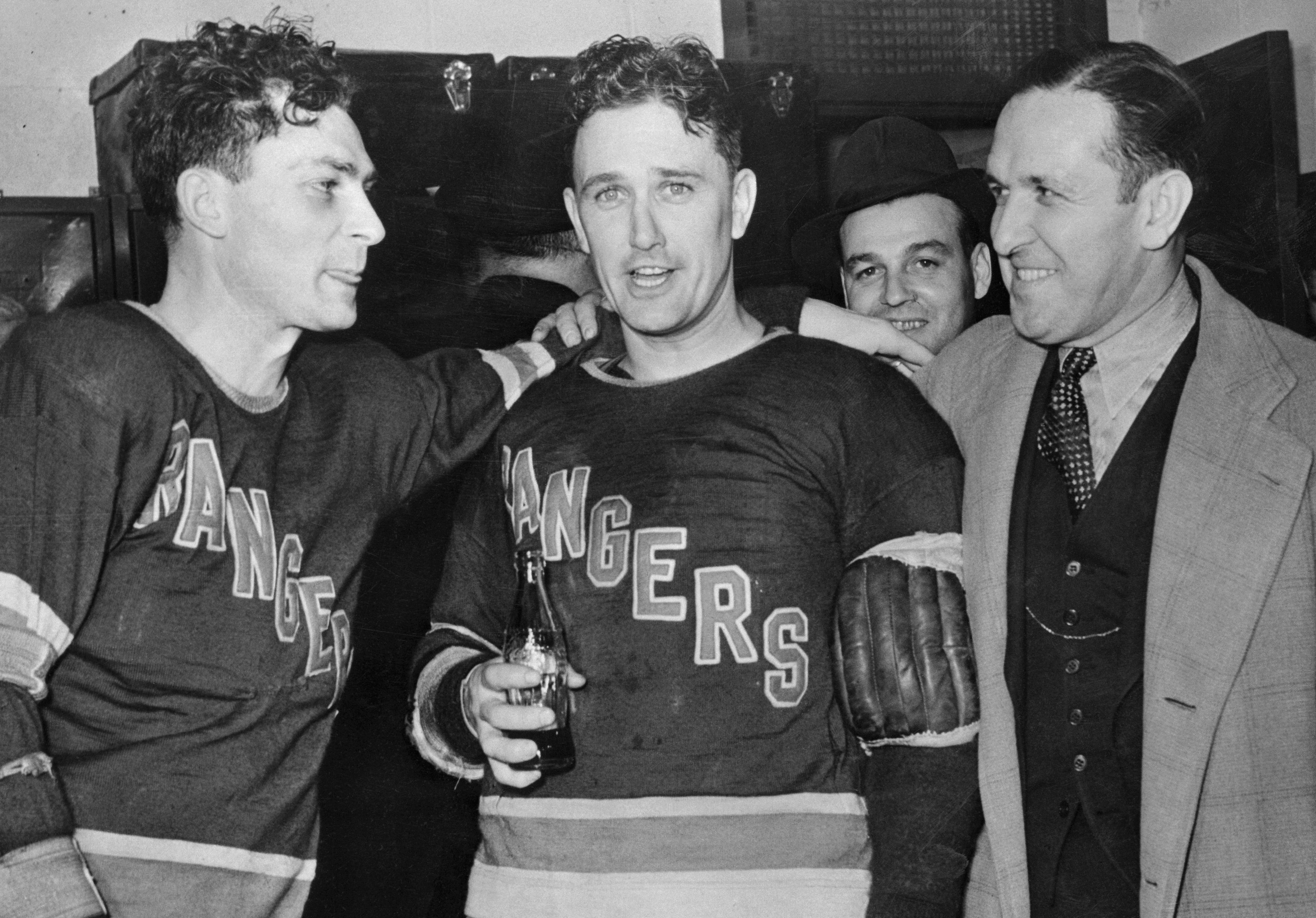It took a mere seven years for the Rangers to win the third Stanley Cup and — like the previous National Hockey League champions — the 1939-40 edition did it with a flair and a few zany surprises added for dressing.
A few of the surprises were as follows:
- The Blueshirts’ one — and only — coach for the 13 years of the club’s existence, Lester (The Silver Fox) Patrick, suddenly retired in 1939. He turned the reins over to Frank Boucher, who never had coached an NHL game in his life.
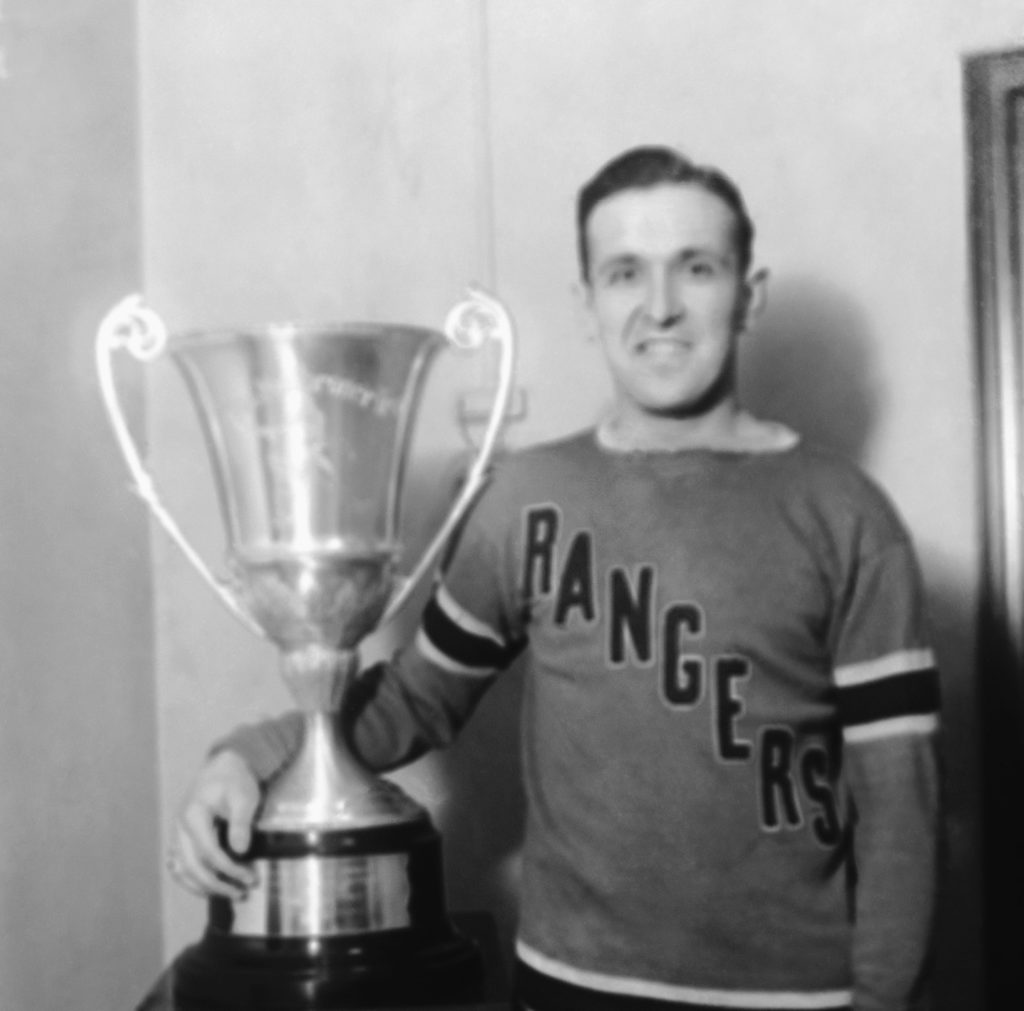
- Although inexperienced, Boucher produced unheard of new strategies in 1939-40 on both the penalty kill and power play. Each helped revolutionize hockey performance.
- On the eve of the Cup-winning game in Toronto, Boucher scrapped the traditional serious team strategy and instead invited his skaters to have a few beers at a hotel pub.
- Skirting tradition and unworried about jinxes, manager Patrick booked a lavish Toronto hotel in advance of Game 6 for a gala Rangers Cup victory party after what he expected — hoped — would be the finale.
Here’s how that totally unreal season unfolded:
Upon taking over the coaching job, Boucher featured a team that was big, tough, fast and inventive. “I’d encourage suggestions,” he said. “The boys came up with them and then we’d practice the new ideas.”
One was the box defense, whereby the four players killing a penalty arranged themselves in a “box” formation in front of the goaltender. A more “sensational” one, as Boucher put it, was an offensive penalty killing combination.
[Read More From the Rangers 90th Anniversary Series]
Instead of playing a tight defensive game, the Rangers would try to turn a disadvantage into an advantage. It was the beginning of modern forechecking. “When we were a man short,” Boucher recalled, “we’d send out three forwards and one defenseman and we’d forecheck in their own end. This worked so well, we scored more goals over the season than we scored against us during the penalty-killing.”
Having finished in second place behind the defending Cup champion Bruins, the Rangers proceeded to eliminate the Beantowners four games to two. Three of the games — including the final two — went into sudden-death overtime, and in each of the contests, the Rangers scored the winner.
Now it was time for the Final Round — Rangers vs. Maple Leafs with the first two games being held at Madison Square Garden. On Alf Pike’s overtime goal, the Blueshirts took the opener 2-1 and annexed the second match, 6-2. The tournament shifted to Maple Leaf Gardens and Toronto rebounded with 2-1 and 3-0 scores.
With the series tied 2-2, the Rangers won the fifth game, 2-1, on defensemen Muzz Patrick’s goal at 11:43 of the second overtime period.
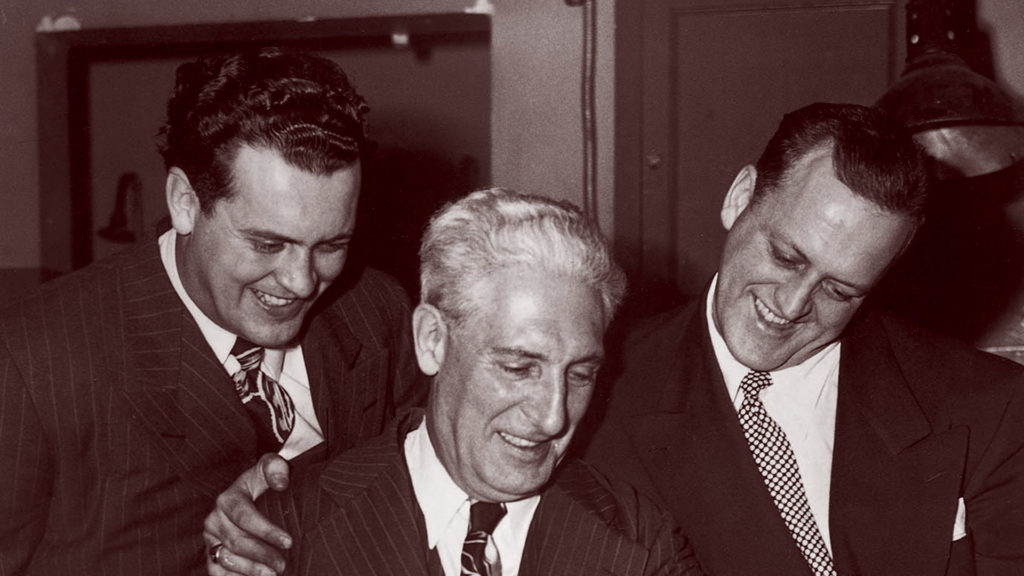
Because the Ringling Brothers, Barnum and Bailey Circus took over the old Madison Square Garden that spring, the remaining games of the climatic series had to be played at Maple Leaf Gardens.
Leading the series three games to two, coach Boucher brainstormed with his players over how to prepare for what could have been the title game on April 13, 1940.
Most teams would have set aside time for strategy and certainly a pep talk, but that was neither the style of either Boucher nor his boss, Patrick.
Author Eric Whitehead, who wrote “The Patricks — Hockey’s Royal Family”, chronicled the Rangers’ unique “strategy” that spontaneously took place the night before the teams took the ice.
“In a style set long ago by Lester,” wrote Whitehead, “there were never any pep talks per se. When the occasion seemed to call for a special gathering of the forces, a quiet chat tuned to the idea that there was a job to do and now was the time to go do it, in the best way possible, always sufficed.
“It had been Lester’s way, and now it was Boucher’s, but Frank figured that this volatile gang of his needed an extra touch such as a pint or two with dear friends in familiar surroundings.”
Boucher chose the Ford Hotel for the “non-pep talk” which would be held in the hotel beer parlor on the afternoon the day before game six against the Maple Leafs. The roster included all the big names on the team including the brothers Neil and Mac Colville, Alex Shibicky, Clint Smith, Phil Watson, Babe Pratt, Ott Heller, Bryan Hextall, Alf Pike, Dutch Hiller, Kilby MacDonald, and the Patrick brothers, Lynn and Murray, alias Muzz.
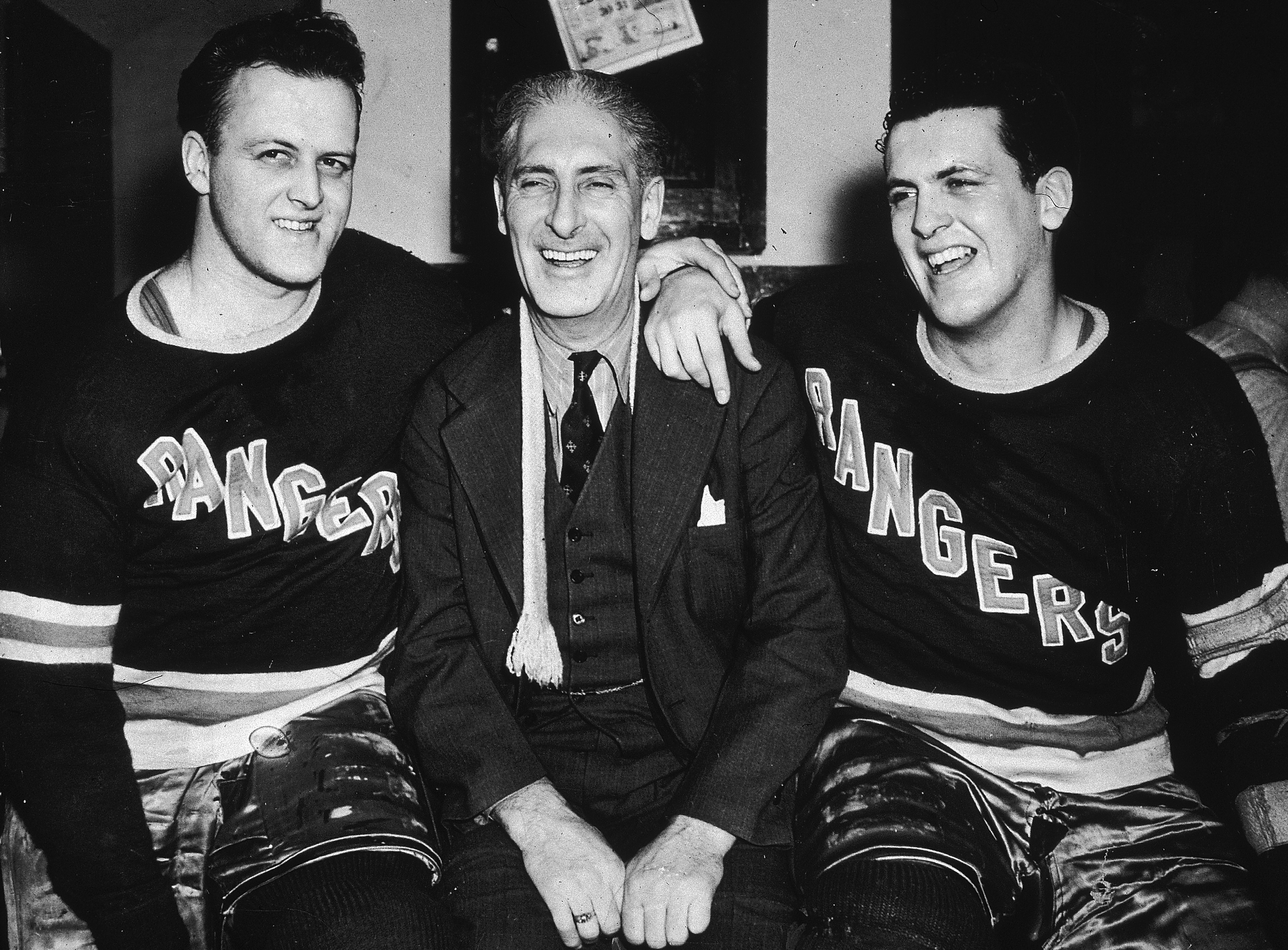
Also featured among the non-teetotalers were the special stars of the playoffs so far. They included the superb goalie Davey Kerr and the captain and star defenseman Art Coulter.
Eric Whitehead: “Coulter opened with a toast, Coach Boucher responded by raising his ale glass, there was a rousing ‘hear … hear …’ from the troops, then a reverent silence as the steins were drained. This, oft, repeated, was the extent of the team meeting agenda, which was, of course, laced with convivial conversation, the odd burst of ribald laughter, and even an occasional more or less scholarly reference to the upcoming game with the Leafs.”
Other NHL teams would have deplored such ribaldry but the Rangers had too many light-hearted aces to let that happen. Players such as Pratt, Muzz and Lynn Patrick and Watson were Good-Time Charlies when it came to their off-ice demeanor. And this was no time to change.
“It was,” Coulter remembered, “a loosener. The team had been playing great hockey and wanted no part of a seventh game in Toronto. The only danger was that of getting a little uptight, and pressing too hard.”
By actual count the “non-pep talk” event lasted until mid evening, consuming what was regarded as “four hours of loosening until there wasn’t an uptight pore in the place.”
Boucher was so into the revelry that he had forgotten he was supposed to be attending a press conference. The happy-go-lucky coach finally remembered, put down his beer, and bolted from the Ford Hotel arriving an hour late for the media scrum.
Boss Lester Patrick, who had not attended his players’ party, was concerned when his players didn’t show up for their evening dinner. Lester dispatched his trainer, Harry Westerby, who found the players in the Ford Hotel beer parlor. Upon seeing Westerby, the players ordered one more round of beer, drank a toast to Harry and adjourned their “meeting.”
The question the next night was whether those rousing Rangers could recover their focus in time to win the hockey match. Boucher was thinking the same thing behind the Rangers’ bench as Toronto forwards Syl Apps and Nick Metz put the home club ahead 2-0 by the end of the second period.
Lester wasn’t too concerned but, just to set things straight, he walked into the Rangers’ dressing room after the second period and sat down on a bench next to his goalie, Kerr. There was a pregnant hush in the room as Patrick looked at all his players and in a relaxed manner delivered this message:
“Well boys, you’ve had your fun, now let’s get down to business. I’ve made arrangements for a victory party in the Tudor Room of the Royal York Hotel. I’ll see you there. Don’t let me down.”
The Silver Fox was not to be disappointed.
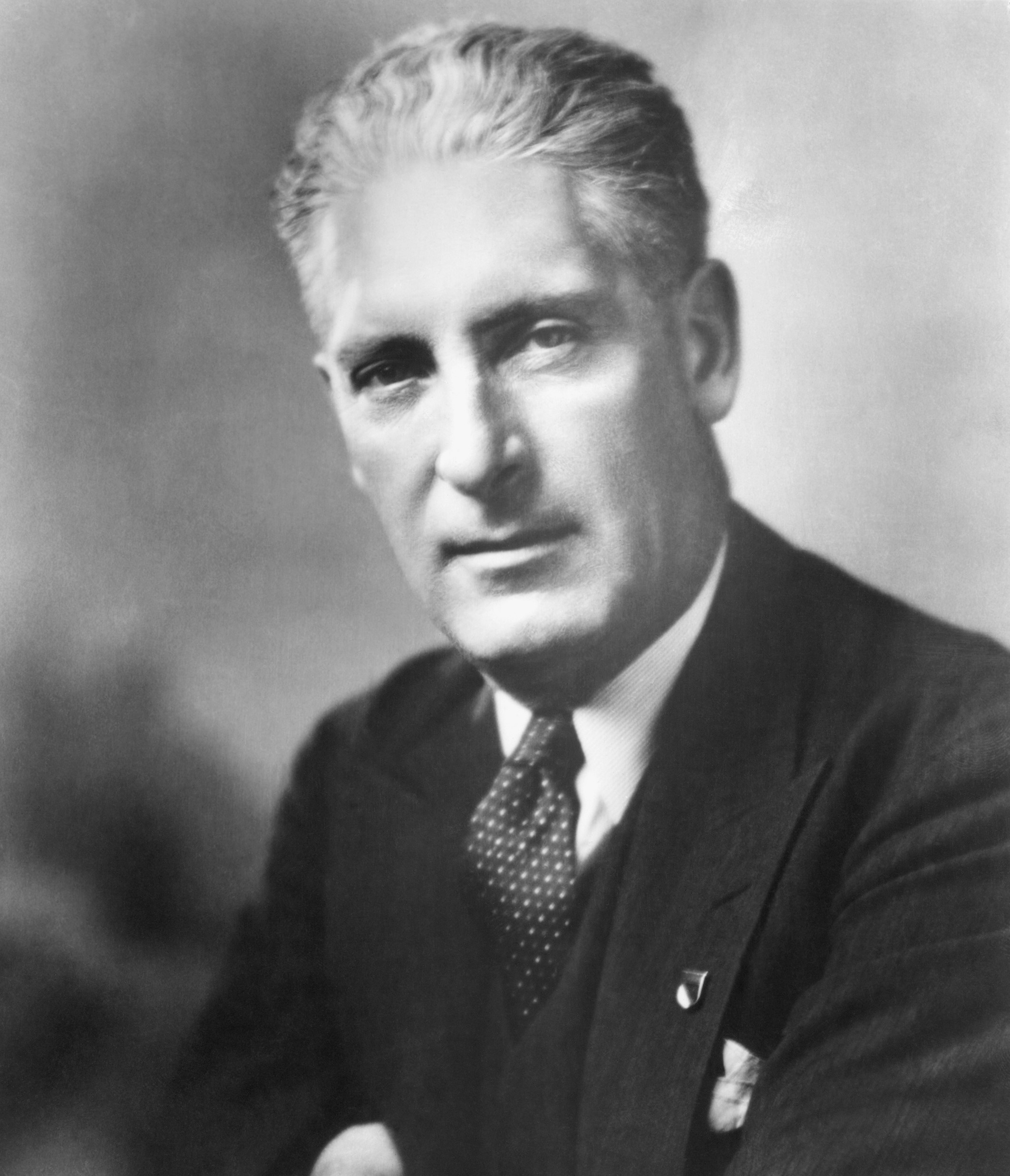
[READ: The Night Lester Patrick Saved the Rangers]
Just after the eight-minute mark of the third period, Neil Colville put New York on the score sheet. Less than two minutes later Pike tallied the Rangers’ second goal after which neither team lit the lamp in regulation time.
When the sudden-death overtime period began, the Blueshirts responded as if they couldn’t wait to pull off their skates and uniforms to hustle over to the Tudor Room of the Royal York.
Just past the two-minute mark of overtime, Hiller fed Watson who detected an unchecked Hextall. The high-scoring right wing who would later be inducted into the Hockey Hall of Fame whipped the rubber past goalie Turk Broda and the Rangers had won The Stanley Cup!
When the dust and celebrations simmered down, NHL President Frank Calder presented the Cup to the jubilant Blueshirts. That was followed by a tearfully sentimental photo as Lester Patrick posed with sons Lynn and Murray holding the Silver Mug.
“It was a historic picture,” concluded author Eric Whitehead, “as this marked the first and only time that the name of a father and his two sons had been engraved on the old bauble.”
Yes, 1940, a year and a Cup for every Rangers fan to remember!
